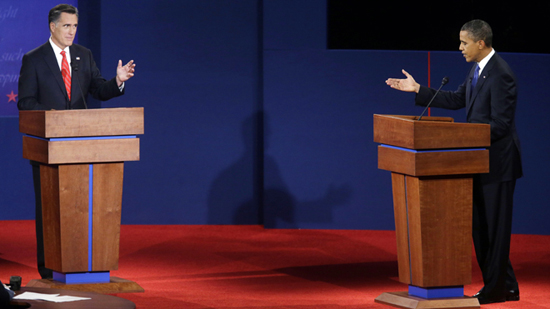
Jennifer Yachnin
E&E Publishing
DENVER — President Obama and GOP presidential nominee Mitt Romney clashed last night over tax benefits to the oil and gas industry and federal investments in the renewable energy industry, as the duo faced off in the first presidential debate of the general election.
Although health care, education and tax reforms dominated the 90-minute debate held at the University of Denver, Obama and Romney also dedicated time to energy policy in several exchanges.
Despite that attention, numerous energy keywords also failed to make an appearance at the debate. Romney raised the specter of the bankrupt California solar firm Solyndra only once by name and he avoided referring to the Keystone XL oil pipeline by name, even as he endorsed the project at one point.
Within the first few minutes of the debate, both candidates called for an expansion of domestic energy production, but avoided describing their strategies as “all of the above,” in the terminology often used by both campaigns.
“I think it’s important for us to develop new sources of energy here in America,” Obama said, outlining his plans to curb the current economic recession.
In response, Romney detailed his own five-part recovery plan, beginning with energy policy, before moving on to trade, education, a balanced budget and support for small businesses: “One: Get us energy independent, North American energy independent. That creates about 4 million jobs.”
Following Romney’s remarks, Obama emphasized his support for renewable energy sources.
“Governor Romney and I, we both agree that we’ve got to boost American energy production, and oil and natural gas production are higher than they’ve been in years,” Obama said. “But I also believe that we’ve got to look at the energy sources of the future — like wind and solar and biofuels — and make those investments.”
But Romney later contested Obama’s production claims, echoing Republican criticisms that while production has increased, it was “not due to his politics. In spite of his policies.”
“Mr. President, all of the increase in natural gas and oil has happened on private land, not on government land. On government land, your administration has cut the number of permits and licenses in half,” Romney said. “If I’m president, I’ll double them, and also get the oil from offshore and Alaska. And I’ll bring that pipeline in from Canada.”
Romney continued: “And, by the way, I like coal. I’m going to make sure we can continue to burn clean coal. People in the coal industry feel like it’s getting crushed by your policies. I want to get America and North America energy independent so we can create those jobs.”
Romney’s denunciations drew immediate praise from the oil and gas industry, as well as criticism from environmental advocates, who disputed his claims of reduced production.
“The real credit should go to private-sector investment, technical innovation by industry, and pro-business state regulatory environments that encourage safe, responsible development,” Western Energy Alliance President Tim Wigley said. “Mr. Obama has virtually no control over these factors and is distorting the truth when he implies otherwise.”
According to statistics provided to E&E Publishing by the Department of the Interior earlier this year, an increase in oil production does appear to be occurring primarily on state and private lands.
But oil production from onshore federal lands also increased 4 percent in the last year, while natural gas production decreased by about the same amount.
During a discussion on tax policy, Obama called for an end to deductions the oil and gas industry is permitted to claim, asserting that those businesses get “$4 billion a year in corporate welfare.”
“Basically, they get deductions that those small businesses that Governor Romney refers to, they don’t get,” Obama said. “Now, does anybody think that Exxon Mobil needs some extra money, when they’re making money every time you go to the pump? Why wouldn’t we want to eliminate that?”
Romney disputed that $4 billion figure, stating: “First of all, the Department of Energy has said the tax break for oil companies is $2.8 billion a year. And it’s actually an accounting treatment, as you know, that’s been in place for a hundred years.”
But Obama cut into his response, retorting: “It’s time to end it.”
The former Massachusetts governor then launched a scathing attack on the Obama administration’s investments in renewable energy resources.
“In one year, you provided $90 billion in breaks to the green energy world. Now, I like green energy, as well, but that’s about 50 years’ worth of what oil and gas receives,” Romney said, referring to tax benefits, loans and other measures included in the 2009 stimulus bill. “And you say Exxon Mobil; actually, this $2.8 billion goes largely to small companies, to drilling operators and so forth.”
Romney continued, suggesting that if corporate tax rates could be cut from 35 percent to 25 percent, the oil and gas industry tax benefits could be eliminated — “Of course it’s on the table,” he said.
“But don’t forget, you put $90 billion, like 50 years’ worth of breaks into solar and wind, into Solyndra, and Fisker and Tesla … I had a friend who said you don’t just pick the winners and losers; you pick the losers. This is not the kind of policy you want to have if you want to get America energy secure.”
During a later discussion on education reform, Romney returned to his criticism of renewable energy investments, lamenting that the funds could have been better used.
“You make a very good point, which is that the place you put your money just makes a pretty clear indication of where your heart is. You put $90 billion into green jobs. And … look, I’m all in favor of green energy, [but] $90 billion, that would have hired 2 million teachers.”
He went on to assert that “about half” of the recipients of those funds “have gone out of business.”
Several media outlets that fact-checked statistics used in the debate, including USA Today and The Washington Post, disputed that statement as inaccurate while acknowledging that Solyndra defaulted on the $535 million loan it received through a Department of Energy program.
Despite an effort by the League of Conservation Voters, Environmental Defense Fund, Sierra Club and National Wildlife Federation to encourage moderator and “PBS NewsHour” Executive Editor Jim Lehrer to raise the subject of climate change during the debate, he did not do so, and neither candidate broached the subject independently.











